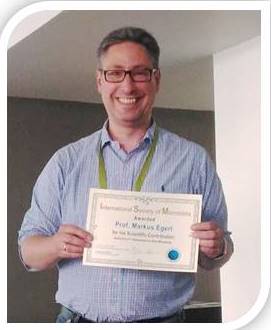Role of the skin microbiota in human health and disease: Dr Markus Egert was awarded for his scientific contribution

During the 2nd Symposium on Skin Microbiota, Dr Markus Egert from the Faculty of Medical & Life Sciences (MLS), Institute for Precision Medicine, Furtwangen University, Villingen-Schwenningen, Germany gave a concise overview about "More than skin-deep: the role of the skin microbiota in human health and disease". This strategic presentation was awarded by the scientific contribution from the scientific committee.
According to Dr Egert: "The human skin is one of the largest and most versatile organs of the human body. Owing to its function as a protective interface between the largely sterile interior of the human body and the highly microbially contaminated outer environment, it is densely colonized with a diverse and active microbiota. Today, this skin microbiota is recognized as an important driver of human health and well-being. It is influenced by many host and environmental factors and interacts closely with the skin immune system. Although cause and effect might be difficult to discriminate, changes in skin microbiota structure and function clearly play a role in the pathobiology of many skin diseases and cosmetic disorders, such as body odor production. Hence, treatment and prevention strategies have to respect this role, rendering pre- and probiotic and even transplantation therapies an additional option to the use of antibiotics. Key questions in the field of skin microbiota research deal with (a) a deeper understanding of the structure (species inventory) and function (physiology) of the healthy human skin microbiota in space and time, (b) the distinction of resident and transient skin microbiota members, (c) the distinction of beneficial skin microorganisms from microorganisms or communities with an adverse or sickening effect on their hosts, (d) factors shaping the skin microbiota and its functional role in health and disease, (e) strategies to manipulate the skin microbiota for therapeutic reasons."
Testimal from Dr Egert: "I definitely enjoyed the ISM Skin Microbiota meeting very much, and I certainly felt very honored to receive the speaker award. Overall, the presentations were very carefully selected and provided a good overview about state-of-the-art topics and new products in the field of skin microbiota research. The meeting was also an excellent opportunity for networking. Personally, I feel that skin microbiota research is still lagging a bit behind gut microbiota research, e.g. regarding the functionality of the microbiota and its (functional) involvement in human health and disease. For instance, while it very clear that butyrate (by fueling the colonocytes) plays a crucial role for the human intestinal homeostasis, similar knowledge about the role of skin microbiota metabolites is still largely missing. Here, more research is needed, in particular because metabolites might be used much easier as therapeutics or in skin care products than living microorganisms."
If you would like to have more information about skin microbiota symposium, please follow this link.
























































